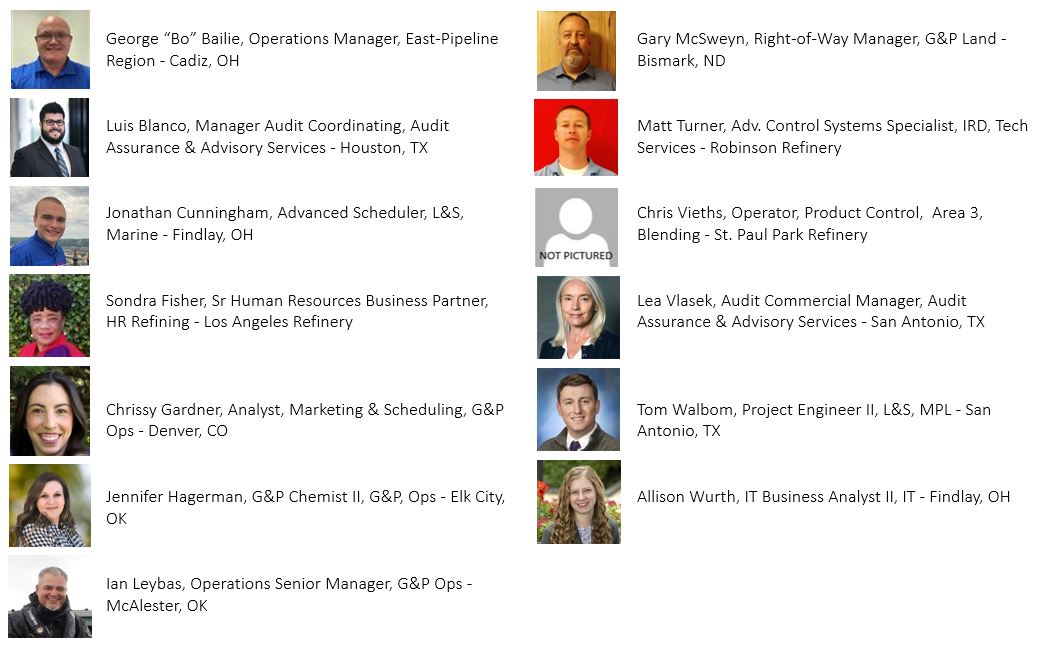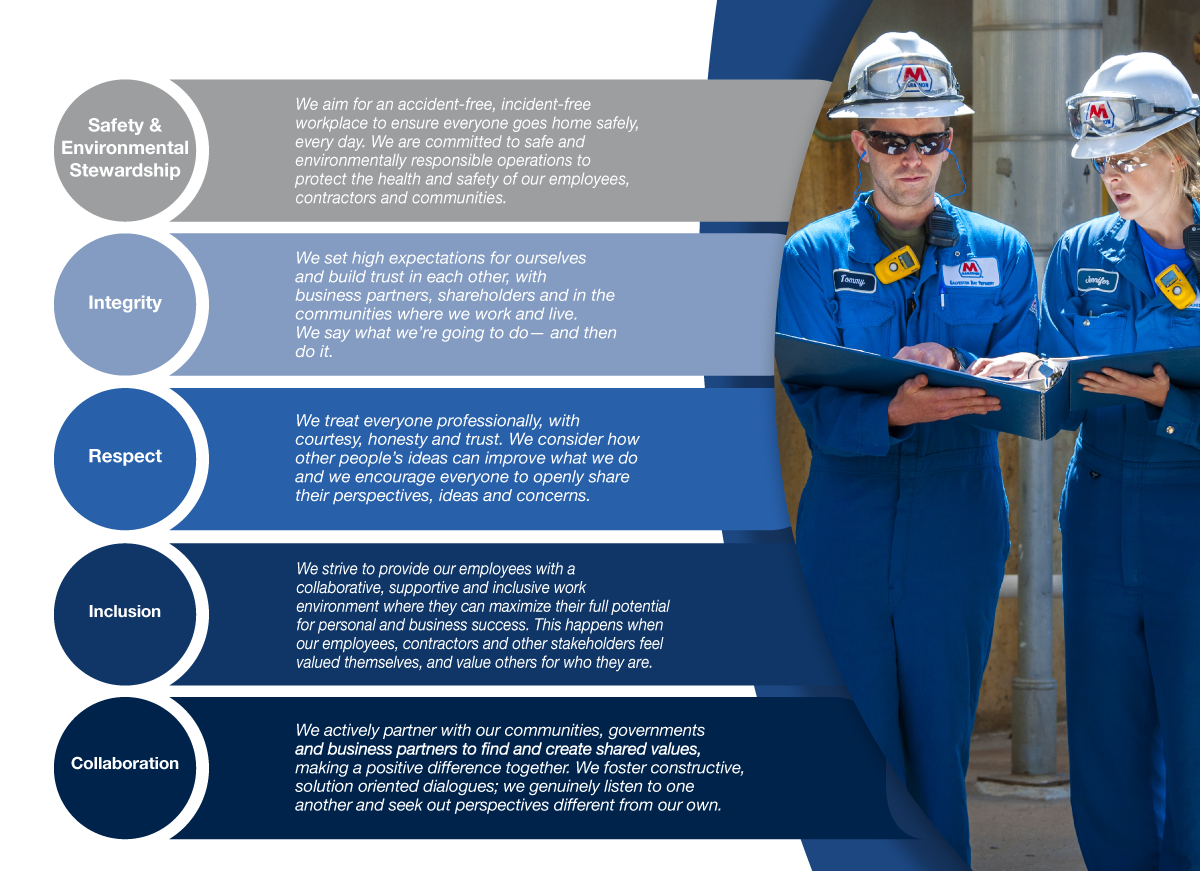Q2 2023 Integrity Advocate
Newly Appointed BI&C Partners
What do the individuals below all have in common? They are the newest, among the 80+ employees throughout our company who serve as Business Integrity and Compliance (BI&C) Partners.

Since 2014, the BI&C Partner Program has cultivated and trained a select group of individuals—nominated by management—to help serve as ambassadors for integrity, and compliance and ethics in their respective organizations. BI&C Partners help to promote and strengthen our Compliance and Ethics (C&E) Program.
Responsibilities of the BI&C Partner:
- Actively look for opportunities to work with organization and local management to increase employee awareness and understanding of the Code of Business Conduct, Company Policies, integrity as a core value, and our C&E Program.
- Assist organization and local management to understand the disclosure and approval requirements associated with the Conflicts of Interest and Business Courtesies Policies.
- Encourage the reporting of allegations to appropriate resources, including, but not limited to the Integrity Helpline.
- Reinforce the Company’s anti-retaliation policy.
- Assist BI&C with presenting compliance and ethics training.
- Act as a liaison between the organization or location and BI&C to identify specific compliance and ethics issues and determine targeted training needs; meet at least quarterly with organization or local management.
- Promote and encourage the timely completion of the Annual Code of Business Conduct Questionnaire and Certification and answer employee questions.
- Distribute publications and other BI&C materials and help reinforce messaging, with special attention given during Corporate Compliance and Ethics Week in November.
- Provide feedback to BI&C on the effectiveness of BI&C’s strategies, communications and training.
Who is your BI&C Partner?
Designated groups throughout the enterprise have at least one BI&C Partner who serves as a liaison between BI&C and the employees within their respective Partner’s group. Do you know who your group’s appointed partner is? Review the list of BI&C Partners to find out who serves this role in your group and visit the BI&C Partner Page on MPCConnect to learn more about the Program.
Where There's a Will, There's a Way
During his 84 years, Frank Perdue was responsible for the evolution of his family’s chicken business into Perdue Farms, now one of the largest and most successful chicken-producing companies in the United States. More impressive to some though, was his recipe for success and who he was at the core.
As his wife Mitzi said, “Frank was firm in his belief that leading a happy life required living with integrity and following one’s highest values. He believed that, at the end of the day, people who live in this way gain self-respect and the trust of others. Ultimately, living with integrity begets successful relationships – not just at home, but in the business world as well.” (2022)
With the hope of instilling these values in future generations of the Perdue family, Frank left his family with this Ethical Will upon his passing:

- Be honest always.
- Be a person whom others are justified in trusting.
- If you say you will do something, do it.
- You don't have to be the best, but you should be the best you can be.
- Treat all people with courtesy and respect, no exceptions.
- Remember that the way to be happy is to think of what you can do for others. The way to be miserable is to think about what people should be doing for you.
- Be part of something bigger than your own self. That something can be family, pursuit of knowledge, the environment, or whatever you choose.
- Remember that hard work is satisfying and fulfilling.
- Nurture the ability to laugh and have fun.
- Have respect for those who have gone before and learn from their weaknesses and build on their strengths.[1]
Just as Mr. Perdue’s Ethical Will acts as a guide for living with integrity and instilling values within his family, MPC’s Code of Business Conduct (Code) does the same for our company. The Code sets forth our core values and is based on the principles of trust, respect, dignity, and honesty and acts as a guide for how employees, contractors, and anyone else acting on behalf of MPC should conduct themselves.
MPC's Core Values
We strongly believe that how we conduct our business is just as integral to our success as the execution of our strategy. As a result, we strive to act responsibly with those who work for us, with those business partners who work with us, and in every community where we operate.

While we know who we are and what we stand for, neither MPC nor individual persons within our company–our executives, leaders, managers, employees–can simply rely on written codes of conduct and stated values to create an ethical culture. Instead, individuals must make accountability and responsibility for ethical conduct a personal commitment by taking actions and embracing decisions that produce ethical outcomes.
If ever you’re faced with a situation that doesn’t align with our Code and core values, let your good judgment be guided by the principle of always doing the right thing for the right reason. Do not hesitate to bring up issues or concerns with your supervisor, manager or other appropriate personnel. Be confident that we stand behind our Code and stand behind those who raise concerns in good faith.
[1] Perdue, M. (2022, December 12). My husband Frank Perdue had an “ethical will.” here’s why you need one, too. Fox News. https://www.foxnews.com/opinion/husband-frank-perdue-ethical-will-you-need-one
Be an Ethical Leader
As demonstrated in the previous article, good ethics is good business, and every employee at our company can and should aspire to be an ethical leader. But it’s not always easy to set a good example and hold both oneself and one’s colleagues accountable to high ethical standards, particularly when we experience pressures to “bend the rules”–from our boss, our coworkers, our customers, etc.
When ethics issues arise, we want to do the right thing, of course. Yet circumstances and other voices often make it difficult to speak up. Silence may seem like the better option, and we choose to live with an uneasy conscience rather than risk (or perceive to be) our reputation, our relationships at work, and perhaps even our job.
Given these challenges, it helps to think of ethical leadership as a matter of performance and acknowledge the need for greater self-awareness as well as some preparation and training. Because ethical leaders are made, not born, we can take steps to improve our own integrity performance.
 Steps Toward Effective Ethical Leadership
Steps Toward Effective Ethical Leadership
Each of us can become a more effective ethical leader in the workplace by developing our own self-understanding and acquiring a set of attitudes and skills. Drawing on the work of Giving Voice to Values, a collaborative project sponsored by the Aspen Institute and the Yale School of Management, here are several steps each of us can take (along with some help from supportive co-workers):
Normalize value conflicts. An essential first step is to recognize that ethics issues are a normal part of business life, rather than a strange and unexpected interruption from routine. For example, if we are in sales, we can expect to find ourselves in situations where a competitor suggests collusion on prices as a win-win or a buyer solicits a bribe in exchange for a contract renewal. Again, if we’re in production, we can expect to face moments where someone proposes to “cut corners” on, say, safety testing in order to meet a deadline.
Whatever our area, whatever our role, we should consider it normal that our values and personal integrity will be put to the test on occasion -- and prepare accordingly.
Appeal to shared values and sense of purpose. We can connect with our fellow employees -- including those on the other side of a specific value conflict -- by tactfully recalling widely shared values such as respect, honesty, and fairness. Similarly, we can establish common ground with our colleagues by appealing to a shared sense of purpose. Gently reminding others of their common commitment to “walking the talk” when it comes to values and mission can create space for a more constructive dialogue in ethics-related situations.
Before value conflicts arise, it helps to define our own personal and professional purpose broadly, and to ask ourselves: What do I really want to accomplish? People with a clear and well-articulated sense of purpose are typically more influential in groups.
Align self-image with values. Are you risk-averse or comfortable being “out there” in moments of conflict? Are you idealistic or more pragmatic in making trade-offs and sacrifices to resolve an ethical dilemma? Knowing your own strengths and preferred style for dealing with others in situations of value conflict can help you act on principle more effectively.
Imagine, and then practice, finding your voice. Visioning is a well-known technique employed by many successful performers in a variety of fields. If you actively envision and pre-script what you’ll say -- and how you’ll say it -- when value conflicts arise, you are more likely to “find your voice” when the time for a “live performance” arrives. Practice giving voice to values with your peers and learn from their coaching and feedback.
Anticipate reasons and rationalizations. Arguments for ethically questionable behavior typically don’t hold water, but they can win the day if left unchallenged. These reasons and rationalizations are predictable: “everyone does it,” “it’s not our problem,” “no one will find out,” and so on. Anticipate common reasons and rationalizations and develop clear, concise counter-arguments. You don’t need to be a star debater to expose a bad idea and present a sound alternative, but it helps enormously to be prepared.
Re-affirm the power of choice. One of the most common rationalizations for unethical behavior is the “we have no choice” argument. This argument can seem irrefutable, especially if a reputation, job, or big contract is (or at least appear to be) at stake. When faced with a value conflict, it’s vital that we re-affirm our capacity to speak up for our values rather than being silenced by a compelling yet false claim.
You can re-affirm the power of choice by recalling your own experience: what has enabled or disabled you in the past? An honest self-appraisal can help you draw on or work around these factors. Finally, make it a habit to honor and appeal to the capacity for choice in others.
A Final Word
Most of us are neither moral heroes nor villains. The truth is that, on any given day, each of us is capable of standing up for what’s right or standing down and letting others determine what happens -- for good or ill. But when workplace ethics issues do come up -- and they will surface as a normal part of doing business -- it’s important to know that we can exercise effective ethical leadership. And we are more likely to do so if we take steps to prepare for a good performance.
Glad You Asked
Below is a sample of inquiries received by Business Integrity and Compliance and responses to the same.
Click arrows below to view the company response to the concern.
The Question: I am interested in running for local elected politics. Is this against company policy?
The Answer: MPC respects the right of employees to engage in the political process in their personal capacities during nonworking hours. In accordance with Policy #9001- Political and Lobbying Activity, employees who are considering running for or being appointed to public office should discuss potential conflicts of interest and work arrangements with their supervisor and notify the Human Resources organization. If you do become an elected or appointed government official, you should disclose such by submitting an Interim Disclosure. Instructions for doing so are available on Business Integrity and Compliance’s SharePoint site.
The Question: We recently had an event at our location and employees and contractors won $25 and $50 gift cards, do we need to submit forms 6016 and form 6278?
The Answer: Yes, in accordance with Policy #2009 – Business Courtesies and the Guidelines for Business Courtesies, retail brand gift cards provided to MPC Personnel must be reported to Payroll (via form 6016) regardless of the value. Similarly, retail brand gift cards, regardless of value, provided to contract and leased workers must be reported to Tax (via form 6728B).
The Question: I have been asked to moderate a panel at an upcoming industry association’s Annual Meeting. I will be paying the full meeting registration fee of $375. The industry association has offered me a complimentary hotel room as a speaker at the event. Is there any issue with me accepting? Or should I pay for it instead?
The Answer: Policy #2009 - Business Courtesies provides instruction for the acceptance of meals, gifts, entertainment and hospitality. Under this policy, in general, MPC Personnel should not accept lodging from third parties, nor accept direct or indirect payment for lodging. Instead, MPC Personnel should pay for such expenses using either the MPC Business Expense Report process or personal funds, as appropriate. There may be circumstances when lodging accommodations may be accepted by MPC Personnel, but regardless of the value, supervisor preapproval must be secured by submitting a Business Courtesies Disclosure in Convercent.
The Question: Will I be randomly drug tested even if I’m not in a safety-sensitive position?
The Answer: In accordance with the Drug and Alcohol Policy Employee Guide, all employees performing work in Safety Sensitive Positions (as defined by Designated Management in consultation with the Vice President, Human Resources and Law) at all Company locations are subject to random testing, except for employees who are covered by a D.O.T. random testing program. In addition, executive management and others as designated by the Vice President, Human Resources are subject to random testing. If your position does not fall within any of these classifications, you are not subject to random testing. However, reasonable suspicion testing will be undertaken when local Management, in consultation with local Human Resources, or the Vice President, Human Resources has reason to believe an employee is in violation of the Drug and Alcohol Policy.
Be an Integrity Advocate
Being an advocate is about speaking up not only about what may be wrong, but also about what is going right. Examples of ethical conduct should be highlighted and celebrated!
We invite you to help expand our scope to include positive stories of integrity in action in future issues of the Integrity Advocate by submitting instances of integrity in action to Business Integrity and Compliance, Room M-01-004 Findlay Campus or [email protected].
